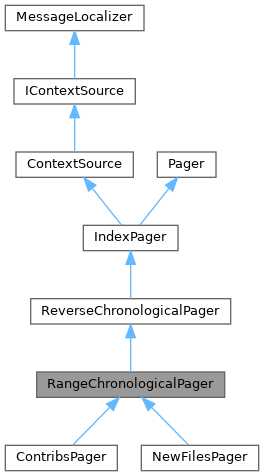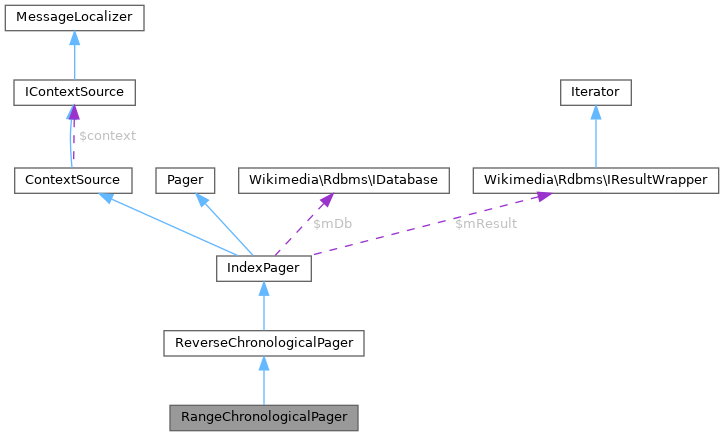Pager for filtering by a range of dates. More...


Public Member Functions | |
| getDateCond ( $year, $month, $day=-1) | |
| Takes ReverseChronologicalPager::getDateCond parameters and repurposes them to work with timestamp-based getDateRangeCond. | |
| getDateRangeCond ( $startStamp, $endStamp) | |
| Set and return a date range condition using timestamps provided by the user. | |
 Public Member Functions inherited from ReverseChronologicalPager Public Member Functions inherited from ReverseChronologicalPager | |
| getNavigationBar () | |
 Public Member Functions inherited from IndexPager Public Member Functions inherited from IndexPager | |
| __construct (IContextSource $context=null) | |
| doQuery () | |
| Do the query, using information from the object context. | |
| extractResultInfo ( $isFirst, $limit, IResultWrapper $res) | |
| Extract some useful data from the result object for use by the navigation bar, put it into $this. | |
| formatRow ( $row) | |
| Abstract formatting function. | |
| getBody () | |
| Get the formatted result list. | |
| getDatabase () | |
| Get the Database object in use. | |
| getDefaultQuery () | |
| Get an array of query parameters that should be put into self-links. | |
| getIndexField () | |
| This function should be overridden to return the name of the index fi- eld. | |
| getLimit () | |
| Get the current limit. | |
| getLimitLinks () | |
| getNumRows () | |
| Get the number of rows in the result set. | |
| getPagingLinks ( $linkTexts, $disabledTexts=[]) | |
| Get paging links. | |
| getPagingQueries () | |
| Get a URL query array for the prev, next, first and last links. | |
| getQueryInfo () | |
| This function should be overridden to provide all parameters needed for the main paged query. | |
| getResult () | |
| getSqlComment () | |
| Get some text to go in brackets in the "function name" part of the SQL comment. | |
| isNavigationBarShown () | |
| Returns whether to show the "navigation bar". | |
| makeLink ( $text, array $query=null, $type=null) | |
| Make a self-link. | |
| reallyDoQuery ( $offset, $limit, $descending) | |
| Do a query with specified parameters, rather than using the object context. | |
| setIncludeOffset ( $include) | |
| Set whether a row matching exactly the offset should be also included in the result or not. | |
| setLimit ( $limit) | |
| Set the limit from an other source than the request. | |
| setOffset ( $offset) | |
| Set the offset from an other source than the request. | |
 Public Member Functions inherited from ContextSource Public Member Functions inherited from ContextSource | |
| canUseWikiPage () | |
| Check whether a WikiPage object can be get with getWikiPage(). | |
| exportSession () | |
| Export the resolved user IP, HTTP headers, user ID, and session ID. | |
| getConfig () | |
| getContext () | |
| Get the base IContextSource object. | |
| getLanguage () | |
| getOutput () | |
| getRequest () | |
| getSkin () | |
| getStats () | |
| getTiming () | |
| getTitle () | |
| getUser () | |
| getWikiPage () | |
| Get the WikiPage object. | |
| msg ( $key) | |
| Get a Message object with context set Parameters are the same as wfMessage() | |
| setContext (IContextSource $context) | |
Protected Member Functions | |
| buildQueryInfo ( $offset, $limit, $descending) | |
| Build variables to use by the database wrapper. | |
 Protected Member Functions inherited from IndexPager Protected Member Functions inherited from IndexPager | |
| doBatchLookups () | |
| Called from getBody(), before getStartBody() is called and after doQuery() was called. | |
| getDefaultDirections () | |
| Return the default sorting direction: DIR_ASCENDING or DIR_DESCENDING. | |
| getEmptyBody () | |
| Hook into getBody(), for the bit between the start and the end when there are no rows. | |
| getEndBody () | |
| Hook into getBody() for the end of the list. | |
| getExtraSortFields () | |
| This function should be overridden to return the names of secondary columns to order by in addition to the column in getIndexField(). | |
| getStartBody () | |
| Hook into getBody(), allows text to be inserted at the start. | |
| preprocessResults ( $result) | |
| Pre-process results; useful for performing batch existence checks, etc. | |
Protected Attributes | |
| $rangeConds = [] | |
 Protected Attributes inherited from IndexPager Protected Attributes inherited from IndexPager | |
| $mDefaultQuery | |
| $mExtraSortFields | |
| An array of secondary columns to order by. | |
| $mFirstShown | |
| $mIncludeOffset = false | |
| Whether to include the offset in the query. | |
| $mIndexField | |
| The index to actually be used for ordering. | |
| $mLastShown | |
| $mNavigationBar | |
| $mOrderType | |
| For pages that support multiple types of ordering, which one to use. | |
| $mPastTheEndIndex | |
Additional Inherited Members | |
 Static Public Member Functions inherited from ReverseChronologicalPager Static Public Member Functions inherited from ReverseChronologicalPager | |
| static | getOffsetDate ( $year, $month, $day=-1) |
| Core logic of determining the mOffset timestamp such that we can get all items with a timestamp up to the specified parameters. | |
 Public Attributes inherited from ReverseChronologicalPager Public Attributes inherited from ReverseChronologicalPager | |
| $mDay | |
| $mDefaultDirection = IndexPager::DIR_DESCENDING | |
| $mMonth | |
| $mYear | |
 Public Attributes inherited from IndexPager Public Attributes inherited from IndexPager | |
| IDatabase | $mDb |
| $mDefaultDirection | |
| $mDefaultDirection gives the direction to use when sorting results: DIR_ASCENDING or DIR_DESCENDING. | |
| $mDefaultLimit = 50 | |
| $mIsBackwards | |
| $mIsFirst | |
| True if the current result set is the first one. | |
| $mIsLast | |
| $mLimit | |
| $mLimitsShown = [ 20, 50, 100, 250, 500 ] | |
| $mOffset | |
| $mPastTheEndRow | |
| $mQueryDone = false | |
| $mRequest | |
| IResultWrapper | $mResult |
| Result object for the query. | |
| const | DIR_ASCENDING = false |
| Constants for the $mDefaultDirection field. | |
| const | DIR_DESCENDING = true |
Detailed Description
Pager for filtering by a range of dates.
Definition at line 27 of file RangeChronologicalPager.php.
Member Function Documentation
◆ buildQueryInfo()
|
protected |
Build variables to use by the database wrapper.
- Parameters
-
string $offset Index offset, inclusive int $limit Exact query limit bool $descending Query direction, false for ascending, true for descending
- Returns
- array
Reimplemented from IndexPager.
Definition at line 99 of file RangeChronologicalPager.php.
References $fname, $options, $tables, and list.
Referenced by ContribsPager\reallyDoQuery().
◆ getDateCond()
| RangeChronologicalPager::getDateCond | ( | $year, | |
| $month, | |||
| $day = -1 ) |
Takes ReverseChronologicalPager::getDateCond parameters and repurposes them to work with timestamp-based getDateRangeCond.
- Parameters
-
int $year Year up to which we want revisions int $month Month up to which we want revisions int $day [optional] Day up to which we want revisions. Default is end of month.
- Returns
- string|null Timestamp or null if year and month are false/invalid
Reimplemented from ReverseChronologicalPager.
Definition at line 79 of file RangeChronologicalPager.php.
References IndexPager\$mOffset, getDateRangeCond(), and ReverseChronologicalPager\getOffsetDate().
◆ getDateRangeCond()
| RangeChronologicalPager::getDateRangeCond | ( | $startStamp, | |
| $endStamp ) |
Set and return a date range condition using timestamps provided by the user.
We want the revisions between the two timestamps. Also supports only having a start or end timestamp. Assumes that the start timestamp comes before the end timestamp.
- Parameters
-
string $startStamp Timestamp of the beginning of the date range (or empty) string $endStamp Timestamp of the end of the date range (or empty)
- Returns
- array|null Database conditions to satisfy the specified date range or null if dates are invalid
Definition at line 42 of file RangeChronologicalPager.php.
References $rangeConds.
Referenced by ContribsPager\__construct(), NewFilesPager\__construct(), and getDateCond().
Member Data Documentation
◆ $rangeConds
|
protected |
Definition at line 29 of file RangeChronologicalPager.php.
Referenced by getDateRangeCond().
The documentation for this class was generated from the following file:
- includes/pager/RangeChronologicalPager.php